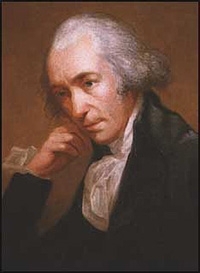James Watt
Watt, James
James Watt (1736-1819), a Scottish inventor, instrument maker and mechanical engineer, is renowned for his improvements on the steam engine. While working at the University of Glasgow as an instrument maker, Watt was asked to repair a model of Thomas Newcomen’s steam engine. He devised improvements that resulted in a new type of engine (patented 1769) with a separate condensing chamber, an air pump to bring steam into the chamber, and parts of the engine insulated. His initial steam engine was four times more powerful than the Newcomen engine. In 1781, he produced a rotary-motion steam engine that could drive many different types of machinery. Richard Arkwright began using Watt's steam engine in his textile factories in 1783, and by 1800, there were over 500 of Watt's machines in Britain's mines and factories. For this contribution, Watt’s steam engine is considered one of the driving forces behind the Industrial Revolution. Watt also coined the term horsepower, and he invented the flywheel. The watt, the SI unit of power, is named for him.
Further Readings
Biography of James Watt (Carl Lira, Michigan State University)
